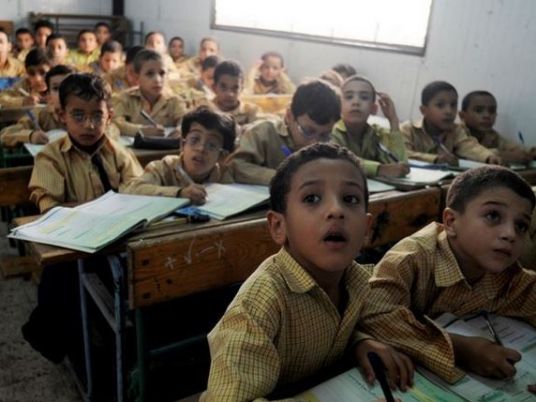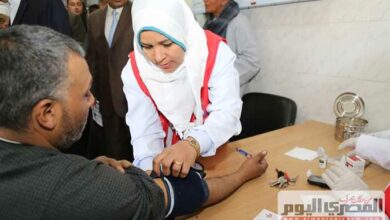Ministry of Health doctors are continuing their fight for better working conditions, higher wages and increased government spending on healthcare as their syndicate prepares for its first elections since the early 1990s.
Around 600 doctors, some wearing their white coats, gathered outside the parliament on Thursday where they competed to be heard over the chants of Unionaire Company workers protesting 50 meters away, part of the wave of labor protests that have broken out in Egypt in recent weeks.
The revolution briefly changed the power dynamic in the Doctors Syndicate as Muslim Brotherhood and regime-affiliated syndicate leaders were pushed aside in favor of reformers. But health ministry policy towards doctors and their demands has changed little under the leadership of new health minister Amr Helmy who, before he was appointed, stood with doctors in protests.
In fact, doctors say, their pay has decreased under Helmy following a ministerial decision passed last week.
“Helmy came from Tahrir, he understands our demands and our situation. He completely changed after he became minister,” Mohamed Badran, a doctor from Beheira, said.
Dr. Mohamed Shafiq was even more frank. “Helmy duped us,” he said. “Reform will never come from above.”
Since 2007 Doctors Without Rights (DWR), a group of activist doctors, has been at the forefront of the campaign for better salaries for doctors and improved healthcare for patients.
The doggedness of its members has meant frequent clashes with the Doctors Syndicate executive board presided over by Hamdy al-Sayyed, a former member of Hosni Mubarak’s now-dissolved National Democratic Party (NDP) who lost his parliamentary seat in 2010 and was frequently criticized as overly sympathetic to the former regime.
In 2008 Sayyed and other members of the executive board, dominated by members of the Muslim Brotherhood, unilaterally quashed strike action doctors had overwhelmingly voted for during a general assembly.
In early 2011 Sayyed was unceremoniously made to physically leave his syndicate office by protesting doctors, before doctors voted in favor of a motion in a March general assembly meeting that Sayyed not be allowed to make media statements in the syndicate's name.
The old guard retightened its grip on the syndicate during the last general assembly in June, however, and doctors at the protest predicted – with a measure of resignation – that the Brotherhood will dominate the syndicate elections, scheduled to take place on 14 October.
“The Muslim Brotherhood don’t take part in these protests. They leave us to do it so we don’t have time to prepare for elections,” Shafiq said.
The size of the Brotherhood, in addition to its formidable organization and mobilization skills, has left groups such as DWR and the Coalition of Powers for the Rights of Egyptian Doctors unable to compete, Shafiq says.
In addition he says there are 80,000 doctors who are not registered to vote in the elections because they are unaware that their names are not automatically added to the syndicate’s electoral register.
Logistical problems, such as the fact that syndicate buildings are simply not big enough to accommodate all members during general assemblies and elections, compound the problem by discouraging participation, especially if they are not aligned with the well mobilized Brotherhood.
This splintering within doctors' ranks manifested itself on 10 September when a call for a strike was made by the coalition but not immediately endorsed by DWR because it had not been voted on by the syndicate general assembly. The result was a lower turnout than during previous strikes.
Improved security in hospitals, better pay, increased educational opportunities and higher health spending remain the key demands of protesting doctors.
“We lack the most basic things in hospitals – even sutures. We really suffer to give patients treatment,” Badran said.
Demands for increased pay and health spending have usually been met by obfuscation by both the health ministry, which says the ministry of finance must provide funds for these increases, and the ministry of finance, which says that there is no money to cover them.
Badran is dismissive of these claims. He insists that health spending must increase to 15 percent of the national budget, adding that funds for this could come by removing subsidies on the highest-octane petrol and directing the difference into health spending.
Health spending currently represents 4 percent of the national budget, according to DWR.
Badran has worked for eight years. His net salary is LE348 per month. In theory he earns LE45 for a 12-hour shift but actually pockets around LE30 after withholdings for taxes and services have been made.
“My brother works in Saudi Arabia and earns 7000 riyals per month. I have thought about leaving Egypt but why should I leave the country to them? I will stay and fix it,” Badran said.




